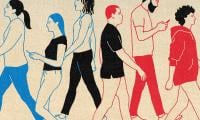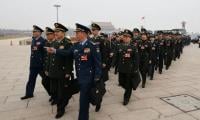Education for the Rohingya
In the summer of 2012, when a particularly gruesome episode of anti-Rohingya violence erupted in the capital city of Myanmar’s Rakhine state, Sittwe, I was a second-year physics student at the town’s university.
Sittwe’s Buddhist residents were attacking Rohingya homes and businesses with makeshift weapons. Soldiers, who had allegedly been sent to the town to help bring an end to the violence, were shooting at the Rohingya with live ammunition.
As a young Rohingya Muslim, I knew that if I went outside I would be tortured and killed either by angry Buddhist mobs or military troops. So, I hid inside my dormitory room. After spending a week in hiding without any food or other supplies, I was informed by the immigration authority that I was no longer a student – I was banned from Sittwe University and denied an education as a result of the racial segregation plan Myanmar authorities imposed in the name of “keeping the peace”.
A few days later, I was forcibly sent back to my hometown, Maungdaw, which is situated in Rakhine state, near Myanmar’s border with Bangladesh. But I did not find safety there either. Security forces were regularly raiding Rohingya homes and dragging away anyone they found inside. They were specifically targeting the young and the educated who they viewed as a threat to their authority. We later found the dead bodies of some of the abducted, while others are missing to this day.
As it was not safe for me to go home, I hid in the jungle with my friends for about two weeks. When it became clear to me that I would never be able to safely return home, I decided to leave Rakhine state for good. After a terrifying journey on a small paddle boat with several other Rohingya, I reached Bangladesh. Most of the people I travelled with chose to remain in the safety of Bangladesh’s refugee camps, but I still wanted to live and study in my own country, Myanmar.
I decided to make my way to Yangon, Myanmar’s most populous and cosmopolitan city, where I had heard Rohingya were allowed to register with the local government and live as temporary residents. Since I did not have a passport or any other travel document, I risked my life illegally crossing first from Bangladesh into India and then from India back into Myanmar. But when I reached Yangon at the end of my arduous journey, all I found there was more anti-Muslim and anti-Rohingya racism and hatred. The entire country was turning against us.
I eventually had to accept the fact that I was not welcome in my homeland. My plan was to seek refuge in Australia, where I thought I could continue with my education. In February 2013, I fled to Thailand by car, passed through Malaysia and took a boat to Indonesia. From there, I attempted to go to Australia by boat but got caught. I spent a year and a half in the Manado Detention Center in Indonesia. But while there the UNHCR recognised me as a refugee and I was eventually transferred to International Organization for Migration’s (IOM) community housing in the port city of Makassar in eastern Indonesia.
Since then, I have been stuck in limbo in Indonesia. I spent the last seven years searching for a way to continue my education, but I have not been successful. I know I will never be allowed to integrate into Indonesian society and receive a university education here. I also have no hope for resettlement in a third country. Given the increased hostility Rohingya are facing in Myanmar, going back home and leading a normal, productive life there is nothing but a dream for me.
And my story is not unique. Thousands of young and able Rohingya eager to study, learn and contribute to their society are languishing either in their own villages and towns in Myanmar where there are no schools and universities for them to attend, or in migrant detention centres, refugee camps and other “temporary” accommodation outside Myanmar with no access to education.
Even our small migrant community in Makassar is full of such people. Sajed Durahaman, a 42-year-old Rohingya refugee, was accepted to study geology at Thain lilwin University in Yangon but was stopped by the government from taking up his place there. Instead, he was forced to wait three years before he could attend Sittwe University, only to be forced out from the country a few years later. Musa Ahmed, a 25-year-old Rohingya, who graduated with a distinction in biology from high school in 2012, was similarly not allowed to attend university in Myanmar. Their disenfranchisement from education continues in Indonesia.
Today, the world sees Rohingya as desperate, simple village people. But this was not always the case. We are the indigenous people of Arakan, which was renamed Rakhine State in 1989 at the same time Burma was renamed Myanmar, and have played a primary role in building a civilisation there. And until very recently there were many Rohingya occupying prominent posts in Myanmar’s government bodies, from police to parliament.
Sultan Mahmud, for example, a prominent Rohingya leader, served as cabinet secretary in the British India legislative Assembly. He later served in former Prime Minister U Nu’s cabinet as health minister. During his time as health minister, numerous health centres, hospitals and schools were established in Rakhine. He was also responsible for sending many Rohingya students to England on state scholarships. Shwe Maung, another prominent Rohingya, served as a member of parliament in the House of Representatives for Buthidaung constituency from 2011 to 2016, but was eventually removed due to his advocacy for Rohingya rights and his ethnic identity. In my hometown, one of my own neighbours, member of parliament Fazal, also a Rohingya, served for years in Myanmar’s parliament before being removed for his advocacy on behalf of the Rohingya people.
Today, Myanmar is not only excluding Rohingya from all state institutions but also trying to erase this history.
Excerpted from: ‘We, the Rohingya youth, demand our right to an education’.
Courtesy: AlJazeera.com
-
 Is Gen Z Becoming The Most Conservative Generation? ‘Progressive Paradox’ Explained
Is Gen Z Becoming The Most Conservative Generation? ‘Progressive Paradox’ Explained -
 Lindsay Lohan's 'scary' Decision Amid War Worries Her Inner Circle
Lindsay Lohan's 'scary' Decision Amid War Worries Her Inner Circle -
 Nebraska Sues Roblox Over Child Safety Failures
Nebraska Sues Roblox Over Child Safety Failures -
 Amanda Holden Finds The Bright Side With Nostalgic Move Amid ‘Britain’s Got Talent’ Crisis Rumors
Amanda Holden Finds The Bright Side With Nostalgic Move Amid ‘Britain’s Got Talent’ Crisis Rumors -
 Strait Of Hormuz Turmoil: Gulf Shipping Crisis Raises Fears Of Global Food Price Shock
Strait Of Hormuz Turmoil: Gulf Shipping Crisis Raises Fears Of Global Food Price Shock -
 Sarah J Maas Makes Exciting Announcement For ‘Acotar’ Series
Sarah J Maas Makes Exciting Announcement For ‘Acotar’ Series -
 Teyana Taylor Makes Shocking Claim About 'One Battle After Another': 'Very, Very Real'
Teyana Taylor Makes Shocking Claim About 'One Battle After Another': 'Very, Very Real' -
 Qatar Airways To Operate Relief Flights From Muscat And Riyadh For Stranded Travelers Amid Global Turmoil
Qatar Airways To Operate Relief Flights From Muscat And Riyadh For Stranded Travelers Amid Global Turmoil -
 2026 Pro-Human AI Declaration: How Humanity Can Control Artificial Intelligence
2026 Pro-Human AI Declaration: How Humanity Can Control Artificial Intelligence -
 Lewis Hamilton Vows To 'put More Work In' As He Gears To Return For 2026 Formula 1 Season
Lewis Hamilton Vows To 'put More Work In' As He Gears To Return For 2026 Formula 1 Season -
 Sarah Ferguson Watches Beatrice, Eugenie Struggle For Parents: ‘She Could Finally Release It’
Sarah Ferguson Watches Beatrice, Eugenie Struggle For Parents: ‘She Could Finally Release It’ -
 Father Takes Major Action Against Google Over Son’s Death
Father Takes Major Action Against Google Over Son’s Death -
 Everything We Know About Michael Sheen’s 'You Told Us To Talk About The Weather'
Everything We Know About Michael Sheen’s 'You Told Us To Talk About The Weather' -
 Jodie Sweetin Breaks Silence On Her Bond With Candace Cameron Bure: 'Not Gonna Hug'
Jodie Sweetin Breaks Silence On Her Bond With Candace Cameron Bure: 'Not Gonna Hug' -
 Indonesia Slams Meta Over Rising Disinformation And Online Gambling Content
Indonesia Slams Meta Over Rising Disinformation And Online Gambling Content -
 Rockstar Pulls GTA 6 From Store After Surprise Leak: Here’s Why
Rockstar Pulls GTA 6 From Store After Surprise Leak: Here’s Why



